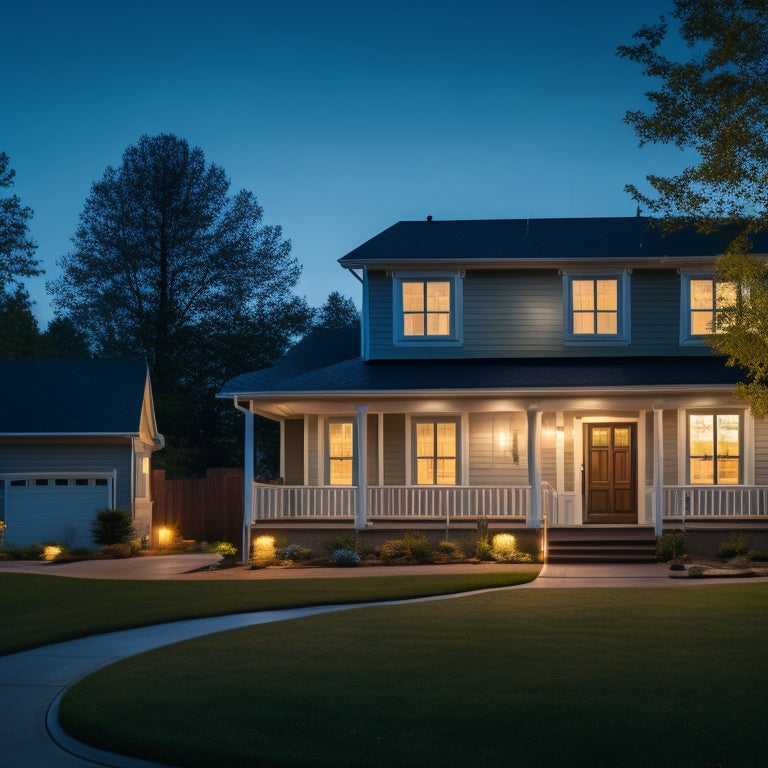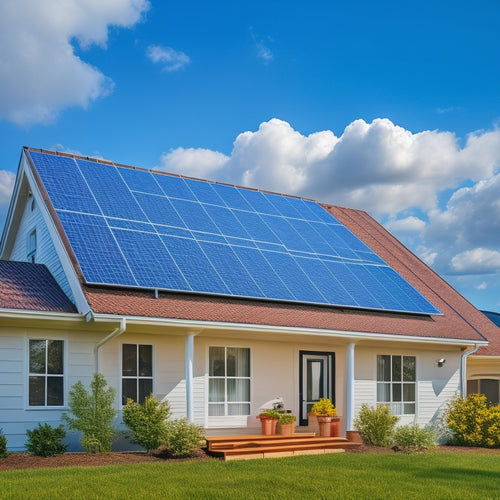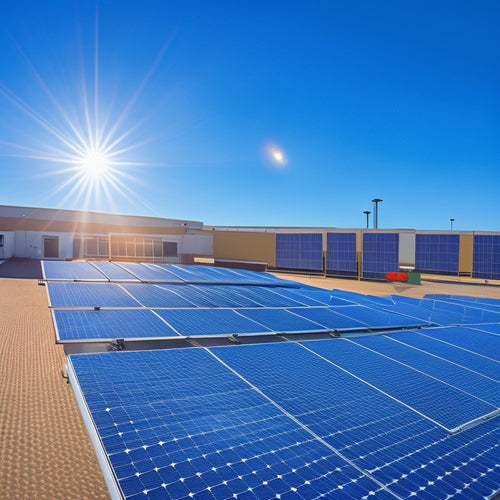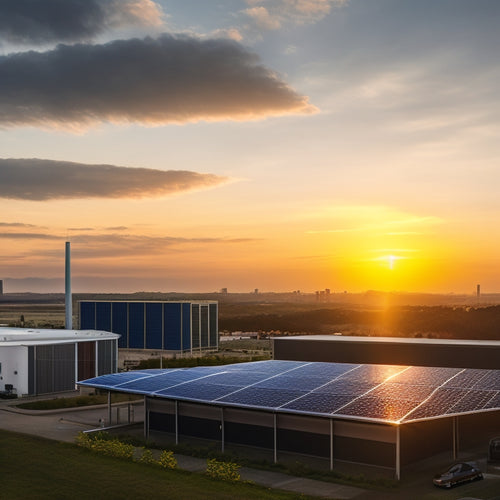
Solar Powered Home Security Made Simple
Share
You're taking the first step towards solar-powered home security by utilizing the reliability and cost-effectiveness of renewable energy to safeguard your property. By choosing the right solar panels, security cameras, and energy storage options, you can create a seamless and efficient system. Installing a wireless solar security system can provide extensive coverage, flexibility, and a reduced environmental impact. From budget-friendly solutions to advanced features like motion detection and low-light performance, there's a range of options to investigate. As you move forward, you'll uncover more ways to optimize your solar-powered home security system for a safer, more sustainable future ahead.
Key Takeaways
- Choose solar panels with high efficiency ratings (above 20%) and consider budget and energy needs for optimal selection.
- Select energy-efficient solar-powered security cameras with clear video quality, motion detection, and low-light performance for effective surveillance.
- Wireless solar security systems offer easy installation, flexibility, and environmental benefits, making them a convenient option for home security.
- Proper installation and maintenance of solar panels, energy storage, and security devices are crucial for reliable and efficient operation.
- Solar-powered home security systems provide energy independence, cost-effectiveness, and environmental sustainability, making them a simple and beneficial solution.
Choosing the Right Solar Panels
With the decision to go solar for your home security system, selecting the right solar panels becomes an essential step.
You'll want to choose panels that provide high solar panel efficiency, which is measured by their ability to convert sunlight into electricity. Look for panels with a high efficiency rating, typically above 20%. For instance, high-efficiency silicon solar cells can achieve conversion rates over 26% advanced energy solutions, making them suitable for off-grid systems.
When it comes to solar panel types, you have two main options: monocrystalline and polycrystalline. Monocrystalline panels are more efficient but also more expensive, while polycrystalline panels are more affordable but slightly less efficient.
Consider your budget and energy needs when making your decision. By choosing the right solar panels, you can guarantee a reliable and efficient power source for your home security system.
Solar Powered Security Camera Options
Among the various components of a solar-powered home security system, solar-powered security cameras are an important aspect, and selecting the right ones can greatly impact the overall performance.
You'll want cameras that provide clear video quality, even in low-light conditions. Look for camera resolution options ranging from 720p to 4K, depending on your specific needs.
Consider cameras with energy-efficient designs that reduce energy consumption and carbon footprint Energy Efficiency and Auditing, allowing you to contribute to a cleaner environment while maintaining a secure home.
Motion detection features are also vital, as they allow cameras to capture footage only when movement is detected, saving storage space and reducing false alarms.
Consider cameras with advanced motion detection features, such as customizable detection zones and sensitivity adjustments.
Wireless Solar Security Systems
You've selected the right solar-powered security cameras, now it's time to contemplate how they'll communicate with your home security system. A wireless solar security system is the perfect solution, leveraging wireless technology to transmit video feeds and alerts to your monitoring station or mobile devices.
This setup eliminates the need for cumbersome wires, reducing installation costs and increasing energy efficiency. With a focus on energy efficiency measures, you can optimize your system's performance while minimizing its environmental impact.
In addition, considering DIY solar kits can provide a cost-effective way to power your security cameras. With a wireless system, you can place cameras in areas with limited access to power outlets, ensuring extensive coverage of your property.
Additionally, wireless technology allows for easier system expansion and reconfiguration, should your security needs change over time.
Installing Solar Power for Security
You'll need to strategically place solar panels to maximize energy harvesting, considering factors like roof orientation, shading, and local building codes.
Next, you'll choose an energy storage option, such as batteries or supercapacitors, to guarantee a reliable power supply for your security system.
Solar Panel Placement
When installing solar power for security, determining the ideal solar panel placement is essential to maximize energy harvesting. You'll want to take into account the best orientation of your panels to capture the most sunlight. In the northern hemisphere, a south-facing orientation is ideal, while in the southern hemisphere, a north-facing orientation is best.
| Orientation | Shading Considerations | Energy Output |
| South-facing | Minimal shading from surrounding structures | High |
| West-facing | Some shading from afternoon sun | Medium |
| East-facing | Some shading from morning sun | Medium |
| North-facing | Heavy shading from surrounding structures | Low |
| Flat/Horizontal | Heavily shaded, not recommended | Very Low |
Keep in mind that shading considerations can greatly impact energy output. Be sure to assess your surroundings and choose a location that minimizes shading to get the most out of your solar panels.
Energy Storage Options
With solar panels in place, the next crucial step in installing solar power for security is selecting the right energy storage options to guarantee a reliable and efficient system.
You'll need to choose the right battery type to store excess energy generated by your solar panels during the day.
-
Lead-Acid Batteries: A cost-effective option, but they've a shorter lifespan and lower depth of discharge.
-
Lithium-Ion Batteries: More expensive, but they offer a longer lifespan, higher depth of discharge, and better charge management.
-
Deep Cycle Batteries: Designed specifically for off-grid systems, they can handle deeper discharge cycles and are a good option for security systems.
When selecting a battery, consider factors like capacity, voltage, and compatibility with your charge management system to guarantee a seamless and efficient energy storage solution.
Wireless System Integration
As you move forward with installing solar power for security, integrating a wireless system becomes an essential step in ensuring seamless communication between your solar-powered devices.
This integration enables real-time monitoring and control of your security systems, even when you're not on-site. With smart home integration, you can receive instant notifications and alerts on your smartphone or tablet, keeping you informed of any security breaches or system malfunctions.
Remote monitoring capabilities allow you to check in on your home's security status from anywhere, at any time. By integrating a wireless system, you can rest assured that your solar-powered security devices are working together efficiently and effectively to keep your home and loved ones safe.
Benefits of Solar Home Security
Three key advantages of solar-powered home security systems stand out: energy independence, cost-effectiveness, and environmental sustainability.
As you consider integrating solar power into your home security system, you'll appreciate these benefits.
-
Energy Independence: Solar power allows your security system to operate independently of the grid, reducing your reliance on utility companies and ensuring continuous protection during power outages.
-
Cost-Effectiveness: By utilizing free energy from the sun, you'll greatly reduce your energy costs and potentially increase your property value.
-
Environmental Sustainability: Solar-powered security systems minimize their environmental impact, supporting your eco-friendly lifestyle and contributing to a cleaner, greener future.
Solar Security System Maintenance
Your solar-powered home security system's reliability hinges on regular maintenance to guarantee it functions at its best. You should inspect your system monthly to confirm all components are secure and functioning correctly.
Solar panel cleaning is vital, as dirt and debris can reduce energy output. Clean your panels every 2-3 months, or more frequently if you live in a dusty area.
Battery maintenance is also essential. Check your batteries' charge levels, and perform an equalization charge every 3-6 months to prevent sulfation.
Additionally, verify your system's software is up-to-date. By following these simple maintenance tasks, you'll ensure your solar-powered home security system operates efficiently and effectively, providing you with peace of mind.
Solar Powered Security on a Budget
While investing in a solar-powered home security system can seem costly, you can still achieve effective security on a budget.
By exploring affordable options and DIY solutions, you can protect your home without breaking the bank.
Here are three budget-friendly ways to implement solar-powered security:
-
Start small: Begin with a single solar-powered security camera or motion sensor, and expand your system as needed.
-
Choose energy-efficient equipment: Opt for devices with low power consumption to reduce energy costs and extend battery life.
-
Utilize existing infrastructure: Repurpose old security equipment or hardware to save on installation and material costs.
Frequently Asked Questions
Can I Use Solar Power for My Existing Home Security System?
You can retrofit your existing home security system to run on solar power, choosing suitable solar panel types and energy storage solutions to guarantee a reliable, off-grid power supply, customized to your system's specific energy requirements.
Are Solar-Powered Security Systems Vulnerable to Hacking?
You're right to wonder if solar-powered security systems are vulnerable to hacking; like any connected system, they're not immune to hacking risks, but manufacturers can mitigate system vulnerabilities with strong encryption, secure protocols, and regular software updates.
Do Solar Panels Require Regular Cleaning for Optimal Performance?
You're probably thinking, 'Dust and dirt, no big deal.' But surprisingly, you're wrong! Regular cleaning is essential for peak performance, as dirty solar panels can lose up to 25% of their energy output, making solar panel maintenance a must for maximum energy harvesting.
Can I Get a Refund or Rebate for Installing Solar Security?
You can investigate installation incentives and government programs offering refunds or rebates for solar installations, such as the Solar Investment Tax Credit, which provides a 26% tax credit on qualified expenditures, making your solar security investment more attractive.
Are Solar-Powered Security Systems Suitable for Apartments or Rentals?
You'll be interested to know that 70% of renters prefer apartments with security systems. Fortunately, solar-powered security systems are suitable for apartments, offering wireless and portable options that can be easily installed and removed when you move, making them ideal for rental properties.
Related Posts
-

Cost of Solar Panel Installation
You can expect to pay between $15,000 and $30,000 or more for a typical solar panel installation, depending on the sy...
-

Essential Solar Panel Mounts for Commercial Properties
When it comes to essential solar panel mounts for your commercial property, durability and wind resistance are key fa...
-

Advantages of Commercial Solar Battery On-Site Storage
By investing in a commercial solar battery on-site storage system, you can greatly reduce your energy grid dependence...


